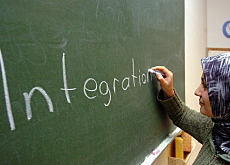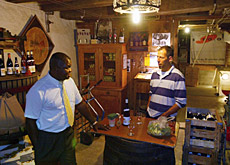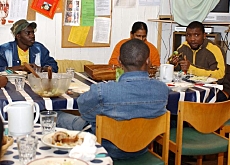Migration report calls for better integration

The Swiss-based Global Commission on International Migration (GCIM) is calling for greater integration of the world's 200 million migrants.
In a report, “Migration in an interconnected world: New directions for action”, it warns there is a danger of migrants becoming marginalised and alienated.
“These new directions are based on a certain number of factors and realities that we have noted over the past two years,” Rolf Jenny, the Swiss executive director of the GCIM, told swissinfo.
“We noted a number of very good practices and policies but we also came across the contradictions and weaknesses in current migration policy and saw very clearly the constraints and challenges that policy-makers in all regions are facing,” he said.
In a report presented to UN Secretary-General Kofi Annan in New York on Wednesday, the GCIM said the international community had failed to realise the full potential of migration and had not risen to the many opportunities and challenges it presents.
Migration makes a large but largely unrecognised contribution to the global economy, it said, and concerted efforts are required to ensure that migrants and their host societies benefit from a mutual process of adaptation and integration.
Global framework
The GCIM proposed a comprehensive global framework based on six broad principles for action and a number of related recommendations.
These principles cover the role of migrants in a globalising labour market, migration and development, irregular migration, migrants in society, the human rights of migrants, and the governance of migration.
According to the report, the expansion in the scale and scope of migration seems certain to continue for the foreseeable future and may well accelerate, due to the growing developmental, demographic and democratic disparities that exist between different regions of the world.
Between 1980 and 2000, the number of migrants living in the developed world increased from 48 million to 110 million, compared with an increase from 52 million to 65 million in the developing world.
Foreign workers make up over five per cent of the labour force in eight European countries – in Switzerland the figure is around 25 per cent and in Geneva 40 per cent. Foreigners make up 20 per cent of the Swiss population.
“Migration has great economic, social and cultural potential,” Urs Ziswiler, head of political affairs at the Swiss foreign ministry, said at the presentation. “It is a global phenomenon that for too long has been managed locally.”
He added: “Switzerland is convinced that migration belongs to the priority issues of the international agenda and will continue to contribute to future efforts in this area.”
swissinfo, Thomas Stephens
There are nearly 200 million international migrants (3% of the world’s population), including 9.2 million refugees.
In 1970 there were 82 million international migrants, a figure which had risen to 175 million by 2000.
Almost half the world’s international migrants are women (48.6%).
An estimated 2.5 to 4 million migrants cross international borders without authorisation each year.
The Global Commission on International Migration has presented a report, “Migration in an interconnected world: New Directions for Action”, to UN Secretary-General Kofi Annan and UN member states.
The commission was launched by Annan and a number of governments in Geneva on December 9, 2003.

In compliance with the JTI standards
More: SWI swissinfo.ch certified by the Journalism Trust Initiative




You can find an overview of ongoing debates with our journalists here. Please join us!
If you want to start a conversation about a topic raised in this article or want to report factual errors, email us at english@swissinfo.ch.